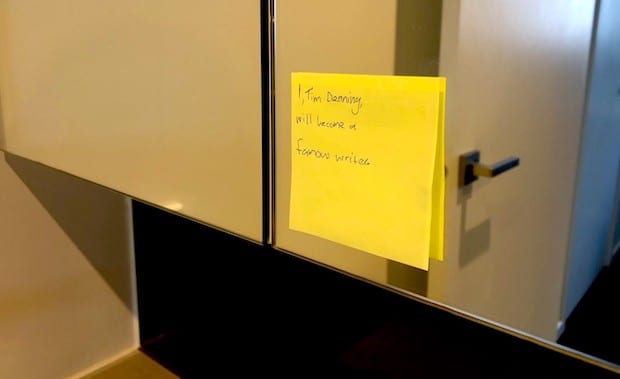Success Advice
Why You Need To Become An Expert At Failure

If there was one thing you want to become an expert in its failure. Failure is the small steps you need to take before you achieve the big step of success. A lot of us don’t understand what it really means to fail, and we are not taught its relationship to success.
It’s time to change what you think about failure and see it as a positive, guiding force in your life. It’s time to get serious about your goals and to raise your awareness of how your heroes really do succeed at all of their endeavors and make the whole thing look so damn easy.
Here are the 9 things you need to know about failure:
1. Fail Fast
A somewhat of a cliché in the startup world is to “fail fast.” Innovation is about trying lots of different ideas with the comfort of knowing that most are meant to fail. Failure is fine as long as you fail quickly. The longer failure drags on, the more your success and mindset are affected.
Get good at recognising failure and being proud of when things don’t give you the desired result. Nothing in your life is perfect, and failure shows us those beautiful imperfections we all have.
“It’s in our imperfections that our true beauty is revealed”
2. Move on quickly from failure
Getting stuck in failure and what has already transpired will put you into a depressed state of being. The trick with failure is to acknowledge it, and then quickly move onto the next idea or venture. Before you move on, extract the lessons, regroup your thoughts, and then be proud that you failed.
Failure takes a lot of guts, and only a mature adult can admit when something hasn’t worked out. The challenge we have in the corporate world is that failure is frowned upon. In the startup world, you’re a freakin hero when you fail, and it’s the cool, new hip way of doing things.
Practice the startup way of failing and you’ll be successful before you know it. Take the “Hollywood actor” corporate approach to failure and you’ll become about as relevant as the horse and cart from the early 1900’s. The choice is yours. Be bold, be smart, and leave your ego behind.
3. Reframe the failure
The word “failure” is a bit of a nasty word and some would say there is no such thing as failure. I like the word failure because it’s something that we can all relate to, and it takes us out of the whole positive thinking cult where we pretend that nothing ever goes wrong.
Stuff goes wrong all the time, and it’s supposed to. The key to failure is to align it in your mind with the word lesson. Lessons are a cheap form of education, and they stop you from blowing more time, energy, and money on concepts that don’t work.
Entrepreneurs who get good at failure typically save thousands, if not millions of dollars in product development.
4. The best products are wrapped in failure
I spent some time in an innovation lab this year, and the whole experience shaped the idea of failure for me. When you see what goes into making a world-class product, you understand just how important failure is.
All good products that become icons of our time have a tremendous amount of failure embedded in them. What makes a product wrapped in failure do so well is when the customer is brought in for the whole failure journey.
Success in business is a fine line between customer lead design, and knowing how to see the world better than it is with a lens that no one is currently using. Consumers didn’t know they wanted a tablet until some bright spark came up with one.
The finished product though had hours and hours of failed attempts at the core of its design. Bottom line; get good at dancing with failure in all aspects of your life and business.
5. Block out the opinions about your failure
Everyone can tell you how they think you should do something, but only you and your team can see the end vision. Conversely, everyone has an opinion on why you failed. Don’t get wiped out by a tidal wave of what people say about your failures.
No one is as close to your failure as you are so they can’t know all the finer details. Getting lost in opinions causes you to get trapped in a reality that won’t move you forward. What one person sees’s as the truth is not always the absolute truth.
Opinions of your failures can derail your confidence and make you experience feelings that will sabotage your success.
“You’re in the driver’s seat of your life so don’t let failure force you to hit the eject button too soon”
6. Understand that failure and success are joined at the hip
I get asked all the time by Addicted2Success fans how to have more success. The big secret that nobody’s talking about is to understand that failure and success are joined at the hip. If you want more success, then you have to add in more failure.
Success and failure are part of the same recipe called “Your Dream.” You are not just going to trip over success in the street and suddenly make it. By increasing your failure rate, you allow yourself to see more success.
While listening to the famous skateboarder Tony Hawk recently, I got the idea of failure nailed in my mind. Tony said that when he is trying to learn a complicated trick that’s never been done by any human before, he fails 99 times out of 100.
When he did the nine hundred degree spin for the first time, it wasn’t because he had more skill. There were plenty of other skateboarders trying to do the same trick at exactly the same time. What made Tony Hawk successful was that he was prepared to fail more than them and deal with the fear that comes from potentially enduring a major injury as a result of his failure.
Even the sporting greats like Tony Hawk are not these gods that we perceive them to be. Their secret formula is quadrupling their rate of failure. Are you bold enough to do the same and experience the success that comes along with it?
7. It’s better to fail than never try
Society is full of couch commentators who scream at the TV about how things should be done. Rather than be a passive participant in life, try going out there and failing. It’s better to take action and fail than it is to never try and miss your full potential.
Failure shows us that you are trying, and you haven’t found the right path yet. Most of us don’t know the right path to success yet, even though we fool people into thinking we do with our perfect social media photos.
Wealth starts in the mind and then it manifests itself in the material world. Start trying and forget about your rate of failure. You’ve got this!
“I’d rather you failed a million times than just sat on the couch and did nothing hoping that the lottery will make you rich” – Tim Denning
8. Failure get’s easier
The fantastic thing about failure is that it get’s easier the more you do it. When we do something over and over, it becomes comfortable. The best action you can take in your life is to commit to getting comfortable with failure which is at the root of your eventual success.
9. Failing does not equal quitting
Quitting and failing are two different things. Quitters exit from their dream altogether and blame outside circumstances. They also take no lessons or value away from the experience and choose to live in a state of madness about what has transpired.
Failing is very different and implies that you learned something from the experience and insinuates that you are going to have a second try. Quitting is to cut off from all possibilities and choose not to give your passion a second chance.
Learn to fail and stay away from quitting.
***A story of failure***
I have hundreds of stories of failure but one that stands out clearly to me, from being a blogger, came to me recently. Early on, when I began writing on Addicted2Success over two years ago, I had an article that went semi-viral.
I started to think I was Superman, and I wanted to follow up the blog post with another popular story. At this stage, my purpose, dream, and vision were still not quite clear and I was admittedly a little naive in my thinking at the time.
While thinking about what I could write about next, I remembered the horrible story I went through when I was sixteen years old and was nearly murdered while being out late one night. The story, I thought, had many lessons to be learned and I was sure that people would connect with it.
After going to all sorts of trouble to make the post perfect, and even going to great troubles to get the right photo (and buying a knife for the photo), I published the post, and it didn’t resonate. At the time, I thought that I had failed, and I wasn’t sure if I was cut out to do this whole blogging thing.
Thankfully, I got some sense knocked into me by a few people, and I moved on from this failure. Had it not been for this blog post, I would have continued to live in a false world with an over inflated ego.
Failure brings us back to reality, and it allows us to try again with a new perspective on things. By having the blog post do poorly, I learned more about what I should be writing and changed the direction of my success.
Ultimately, I wouldn’t be here today if it wasn’t for many of these failed blog posts that produced very little result.
What has failure taught you and how have you failed? Let me know on my website timdenning.net or my Facebook.
Success Advice
How to Choose the Best Affiliate Programs for Your Blog
If you follow these steps, you can create an affiliate marketing plan that makes money, fits well with your content, and connects with your readers

Picking the right affiliate programs for your blog is really important. It can make a big difference in how much money you can make and how much your readers get out of your blog. With so many choices out there, deciding which ones to go with can be tricky.
This guide is here to make it easier for you. It will give you clear steps and helpful tips to choose affiliate programs that fit well with what your blog is about, what your readers like, and what you stand for.
For more articles on this theme, please head over to this blog https://blog.partners1xbet.com/.
Understanding Affiliate Marketing
Before you start picking affiliate programs, it’s important to really understand what affiliate marketing is and how it works.
Basically, affiliate marketing is when you promote a product or service on your blog, and then you get paid a little bit every time someone buys something or does something because you recommended it.
It’s great for both the person selling the product and the blogger, because the seller gets more sales with low risk, and the blogger can make money from their blog.
How to Choose the Right Affiliate Programs for Your Blog
1. Assess Your Niche and Audience
The key to doing well in affiliate marketing starts with really knowing what your blog is about and who reads it. Consider the following:
- Your blog’s content: What topics do you cover? Ensure the products or services you promote are relevant.
- Your audience’s interests and needs: What solutions are they seeking? Choose affiliate programs that offer products or services that solve their problems or enhance their lives.
2. Research Potential Affiliate Programs
Once you know what your blog is about and what your readers want, start looking for affiliate programs. Choose ones that are well-known for good products, great customer service, and helpful support for affiliates. Resources to find these programs include:
- Affiliate networks like ShareASale, Commission Junction, and ClickBank.
- Direct searches for “[Your Niche] affiliate programs” in search engines.
- Recommendations from other bloggers in your niche.
3. Evaluate the Commission Structure
The commission structure is a critical factor to consider. Look for programs that offer competitive rates that make your efforts worthwhile. Consider:
- The percentage of commission per sale.
- Whether the program offers a flat rate per action (e.g., per sign-up).
- The cookie duration, which affects how long after a click you can earn commissions on sales.
4. Consider the Program’s Reputation and Sureness
Join affiliate programs with a solid reputation for quality and sureness. This not only ensures that you’re promoting good products but also that you’ll be paid on time. You can:
- Read reviews from other affiliates.
- Check the program’s history and background.
- Look for any complaints or issues reported online.
5. Analyze the Support and Resources Offered
A good affiliate program gives you things like ads to use, training on their products, and helpful managers. Having access to these resources can really help you do a better job at promoting their products.
6. Understand the Terms and Conditions
Before signing up, thoroughly review the program’s terms and conditions. Pay close attention to:
- Payment thresholds and methods.
- Any restrictions on how you can promote their products.
- The program’s policy on affiliate marketing on social media platforms.
7. Test the Product or Service
If possible, test the product or service before promoting it. This firsthand experience allows you to offer genuine charge and build trust with your audience.
8. Look for Recurring Commission Opportunities
Some affiliate programs pay you again and again for subscriptions or services that charge fees regularly. These can provide a more stable income compared to one-time sales commissions.
Implementing Your Choice
After choosing the best affiliate programs, the next step is to smoothly include your affiliate marketing in your content plan. This includes:
- Creating valuable content that naturally incorporates affiliate links.
- Disclosing your affiliate affairs transparently to maintain trust with your audience.
- Tracking your results to understand what works best for your audience and adjusting your strategy accordingly.
Picking the best affiliate programs for your blog involves careful planning, research, and making sure they match what your audience likes and needs.
If you follow these steps, you can create an affiliate marketing plan that makes money, fits well with your content, and connects with your readers.
The real key to doing well with affiliate marketing isn’t just about the products you talk about, but also how much your audience trusts and values your advice.
With enough time, patience, and hard work, your blog can grow into a successful space that earns a good amount of affiliate money and helps your readers choose the right products.
Success Advice
The Power of Ethical Leadership: How Integrity Drives Success
By leading with integrity and ethics, leaders create an environment where employees feel excited to come to work

What differentiates a positive organizational culture that enjoys a clean reputation and long-term success from a toxic culture drowning in scandals, mistrust, and legal fines? (more…)
Success Advice
10 Landing Page Hacks Experts Are Using to Generate Leads
Crafting a landing page that converts is both an art and a science

If you are in the online marketing world, you know the importance of a high-quality landing page. It’s like a secret sauce that can turn a casual user into a solid lead. I will walk you through ten great tips that have worked wonders for me and could do the same for you in creating landing pages that generate leads. (more…)
Success Advice
An Easy to Follow 8 Step Strategy for Creative Problem Solving
A complete process of creative problem-solving encompasses finding problems, developing creative solutions, and implementing your solutions

No matter where you look around the world today, entrepreneurs face a common challenge: The need to stand out from their competitors and win over customers. (more…)
-

 Life4 weeks ago
Life4 weeks agoThe Best Techniques to Boosting Your Memory in a Busy World
-

 Success Advice4 weeks ago
Success Advice4 weeks agoAn Easy to Follow 8 Step Strategy for Creative Problem Solving
-

 Entrepreneurs4 weeks ago
Entrepreneurs4 weeks agoCrisis-Proof Your Business Now: Essential Strategies for Every Entrepreneur
-

 Success Advice3 weeks ago
Success Advice3 weeks ago10 Landing Page Hacks Experts Are Using to Generate Leads
-

 Entrepreneurs2 weeks ago
Entrepreneurs2 weeks agoThe Mindset Shifts Required to Become a Successful Online Entrepreneur
-

 Success Advice2 weeks ago
Success Advice2 weeks agoThe Power of Ethical Leadership: How Integrity Drives Success
-

 Entrepreneurs2 weeks ago
Entrepreneurs2 weeks ago6 Hacks to Boost Your Productivity as a Business Owner
-

 Success Advice1 week ago
Success Advice1 week agoHow to Choose the Best Affiliate Programs for Your Blog
























5 Comments